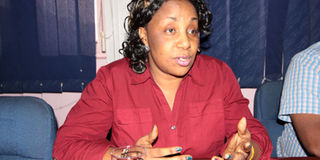Coming home

Fiona Mukasa aharing her life’s story, The reknown gospel artiste is back in Uganda and promises to be “dangerous” as she revives the Fiona Mukasa of the 1980s.PHOTO BY Ian Ortega.
What you need to know:
In the 1990s, she was a staple in gospel music, being one of the few artistes in Uganda but then went silent after she went to the US only coming for short visits. This year Fiona Mukasa is home to stay.
If you happened to attend the Phat Fest show last Friday, you will have seen Fiona Mukasa performing. Fiona is not your ordinary definition of an independent woman. Her story is that of a woman who refuses to follow the crowd and listens to her heart. She has made hard decisions that have impacted on her life in more ways than one and they have paid off quite handsomely.
While any upcoming musician would gladly grab the golden chance of being a celebrated singer’s daughter to climb her way through the trade, this daughter of deceased music icon, Elly Wamala left his music band to sing in a church choir. Being born again, she was yearning to serve God by, “pulling more young people to the church” and the only avenue to actualise this dream was joining a church choir.
“I have no regrets for leaving daddy’s band though he hated the idea. Some fans who had seen me perform vowed to leave his concerts if he failed to convince me to return to his band,” she proudly reminisces with a tone of nostalgia. “At the end of it all, he ended up selling the music equipment and disbanded the music band just like that,” the mother of four children recalls.
Ordinarily, using the name of a fallen musician, especially one’s father, who left a huge fan base can boost one’s profile. However, the she prefers to call herself Fiona Kobz. “I use my father’s name in my official documents but a stage name should be flexible and short. InLondon some people pronounce Mukasa as Mikasa and Makasa so I settled for Fiona Kobz,” she says.
The late 1980s and early 1990s household gospel singer laughs away the question of her age claiming, “Just as Jesus said, even if I told you, you wouldn’t believe,” leaving that question unanswered.
Fiona’s independent attitude saw her go to school only up to senior four at the defunct Kampala Grammar School because, “I wanted to concentrate on my music career and exploit my talent to the fullest.”
Then, at a time when her musical fame was getting to its peak, she left music for a while and resettled in London to, “concentrate on bringing up my little children. I treasure my family because without family you can’t serve God.”
While abroad, she did not lie on her laurels as she continued performing in London and Nigeria. The challenge though was, “the fan base there was not as big and loyal as the one home. The reason I miss Uganda so much and have come back.”
Tracing her music roots
Starting as an imitator of every thing and everybody, she joined her father’s band when she was eight years old and sang with it for three years. The principled Wamala jealously kept her away from the unpredictable public eye. Ideally, she was to be subjected to the back stage and behind the curtains till her father felt she was mature enough.
In a bid to tap her talent and serve God better, she packed her bags and left her father’s band to join the Miracle Centre Rubaga church choir’s gospel music section. Her father whose last memorable message to her came in a text message shortly before his death was, “Fiona, I am proud of you.”
This was a great life test for her to prove her point and the zeal to exploit her musical potential saw her release track after track as the fan base spread like a wild bush fire. Songs like Falling in love with Jesus, Bisule and Weyambe topped the charts of the day.
In no time, she had become a household name among the gospel music faithful, and with her star rising with every passing day, she joined Limit X which had celebrated gospel artistes like Dennis Sempebwa and Issac Rucci and was going global.
“They left me in 1989 and it was not easy singing without them. I found the other guys boring and not as exciting but I pushed on,” she says.
It is no surprise that almost two decades later, these two still stand out as her mentors. “All I can say is that they are good and know what they are doing,” she passionately shares.
Away from the music
When she is not cooking for her family, Fiona is watching movies, “to stay connected with the world.” Interestingly, she does not listen to music as much for a rather strange reason, “I don’t want to get tempted to write other people’s tunes.”
Ugandan gospel and music in general she says, “is getting better every other year but we need more nice videos.” The reason she is re-doing her Weyambe video is to suit the global standards.
She cannot figure out why our artistes keep fighting, “Why are they fighting, we are not competing because God created each of us with uniqueness. We can’t be the same.”
Perhaps now that she is, “no longer tied down by many things” and is back home to settle down with serious plans for reviving the 1980s Fiona Mukasa, we can only hope she can do something since wrangles are slowly but surely gripping the gospel artists. “I am going to be dangerous (of course in a good way). I will no longer be a man pleaser but work for God,” she promises.




